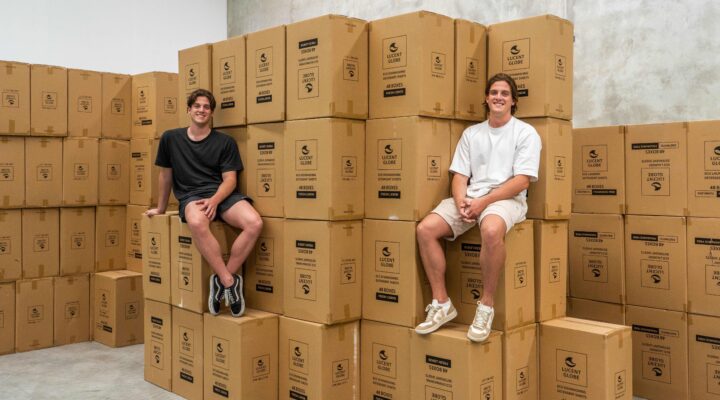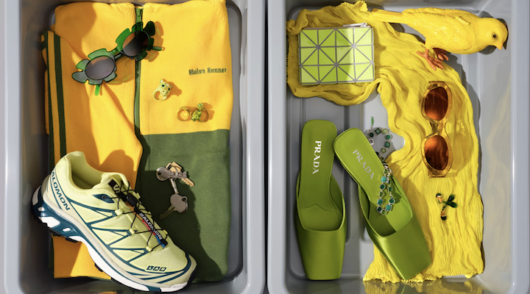In a climate-conscious society, brands are looking to become more sustainable for many different reasons, and businesses across sectors, from fashion to furniture to fast-moving consumer goods, are exploring the circular economy as part of this. Almost 200 countries have signed the Paris Accord to limit global warming to 1.5 degrees, Australia being one of them. Becoming circular requires businesses to make changes to all levels of the supply chain, from product creation to shipping and the reta
e retail space itself.
Recent announcements show how some players are making progress on this front. Ikea Australia stated in its sustainability report that it had diverted 640,000 products from landfill in 2023, including 22,500 preloved products acquired through its new buy-back service.
Meanwhile, new-to-market brands like Lucent Globe, a household cleaning start-up, are embracing a circular model from launch, and fashion brands with physical locations are proving sustainable store design can look chic too.
Here’s a closer look at how three retailers are tapping into the circular economy.
Lucent lightbulb moment for FMCG
Lucent Globe is an Australian eco-concious cleaning product brand that was founded in 2022 by Gold Coast twins Roger and Brodie Cook. The business has experienced 5900 per cent year-on-year growth and the brothers say a big part of this is in their no-compromise approach to launching their zero-waste biodegradable detergent and dishwasher sheets with recyclable packaging.
Such an approach could have been risky, CEO and co-founder Brodie Cook told Inside Retail, “Our success story offers invaluable lessons for retailers aspiring to make a mark in the sustainable retail landscape. It underscores the need for a genuine commitment to sustainability, rather than a mere marketing ploy. Consumers are discerning and can distinguish between greenwashing and authentic eco-conscious practices.”
The “say-do gap” is the term coined to define the lack of follow-through from the 78 per cent of consumers who say they want to buy sustainable goods, even if this means paying a premium. The reality is very few do, according to Bain and Company’s Unpacking Asia-Pacific Consumers’ New Love Affair with Sustainability report.
Co-founder of Lucent Globe, Roger Cook told Inside Retail, “There has been a surge of interest in sustainable goods in Australia, with consumers becoming the driving force. As one of the newfound businesses at the forefront of this sustainable revolution, we have chosen not only to embrace the sustainability shift, but to thrive in it, offering our customers an opportunity to not only do good by planet, but also secure a cost-efficient alternative to their everyday household goods. Two pain points that ring all too true in a cost of living crisis.”
Roger pointed to a common misconception of compromise on quality or price when it comes to sustainable product alternatives. “It’s for this reason we set out to defy such stereotypes, educating our customers on the benefits of choosing better by planet and wallet,” he said.
Ikea Australia dabbles in second-hand deals
Swedish furniture giant Ikea has a global goal to become a circular business by 2030, which means Ikea products will be designed to be used and re-used before being repurposed, refurbished, or recycled. It will also include reducing waste – both in the raw materials and energy consumed as a global business.
Renea Robson, sustainability manager at Ikea Australia told Inside Retail, “Ikea Australia lead the way with circularity initiatives – we’re proud to be among the first Ikea countries in the world to launch the buy-back service for customers to bring back their preloved Ikea items to have a second life, as one example.”
Ikea Australia intends to build on its current circularity initiatives as the second-hand market in Australia continues to grow. Ikea resold 22,500 products in FY23 compared to just over 15,000 in FY22. The retailer’s as-is department sold over 640,000 pieces in FY23 compared to 600,000 in FY22.
In studies conducted as part of the Ikea Sustainability report, 77 per cent of Australians agreed that living a more sustainable life contributes to saving money, compared to 52 per cent in the year prior.
This information led to the launch of Ikea’s Sustainable Living Shop, a dedicated space that offers products and solutions that are affordable. In 2023, Ikea Australia sold 28 million items from the shop.
Scraping off the build-up of plastic with biodegradable alternatives
Another example of innovative thinking when it comes to sustainability is Quicksilver’s partnership with Australian science technology company Uluu to combat the excessive use of plastic in the fashion industry. The result was a plastic-like wax comb made from seaweed, which the retailer launched alongside apparel including boardshorts.
Uluu is an Australian science-tech company that is transforming seaweed into a functional biodegradable plastic replacement. The material has the same durability as plastic minus the fossil fuel footprint and micro-plastic shedding.
Completing the job from waste to product
Australia’s largest recycling company Visy already recycles 40 per cent of kerbside recycling bins in the country, but it doesn’t stop there as it recently acquired the assets of Advanced Circular Polymers (ACP), following its collapse late last year. This included over 1,000 tonnes of unprocessed material left on site. Visy is preventing these hard-to-recycle plastics from going into landfill, Mark De Wit, Visy CEO, told Inside Retail, “We’re not just a manufacturing company – diverting material away from landfill is at the heart of what we do.”






